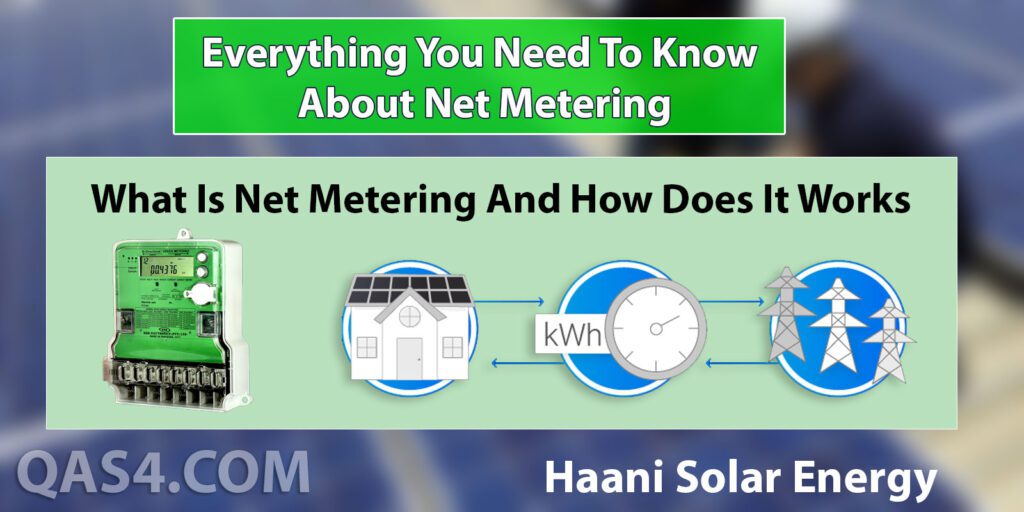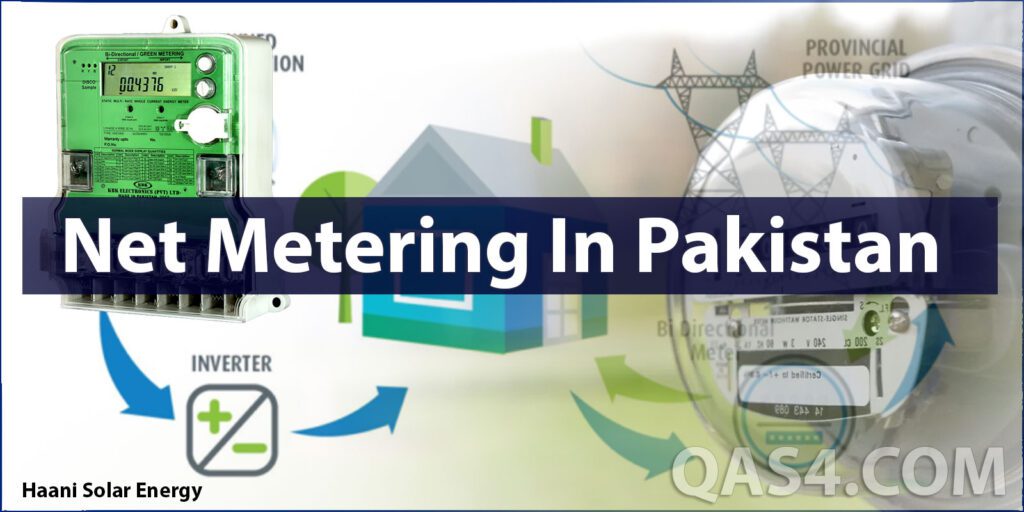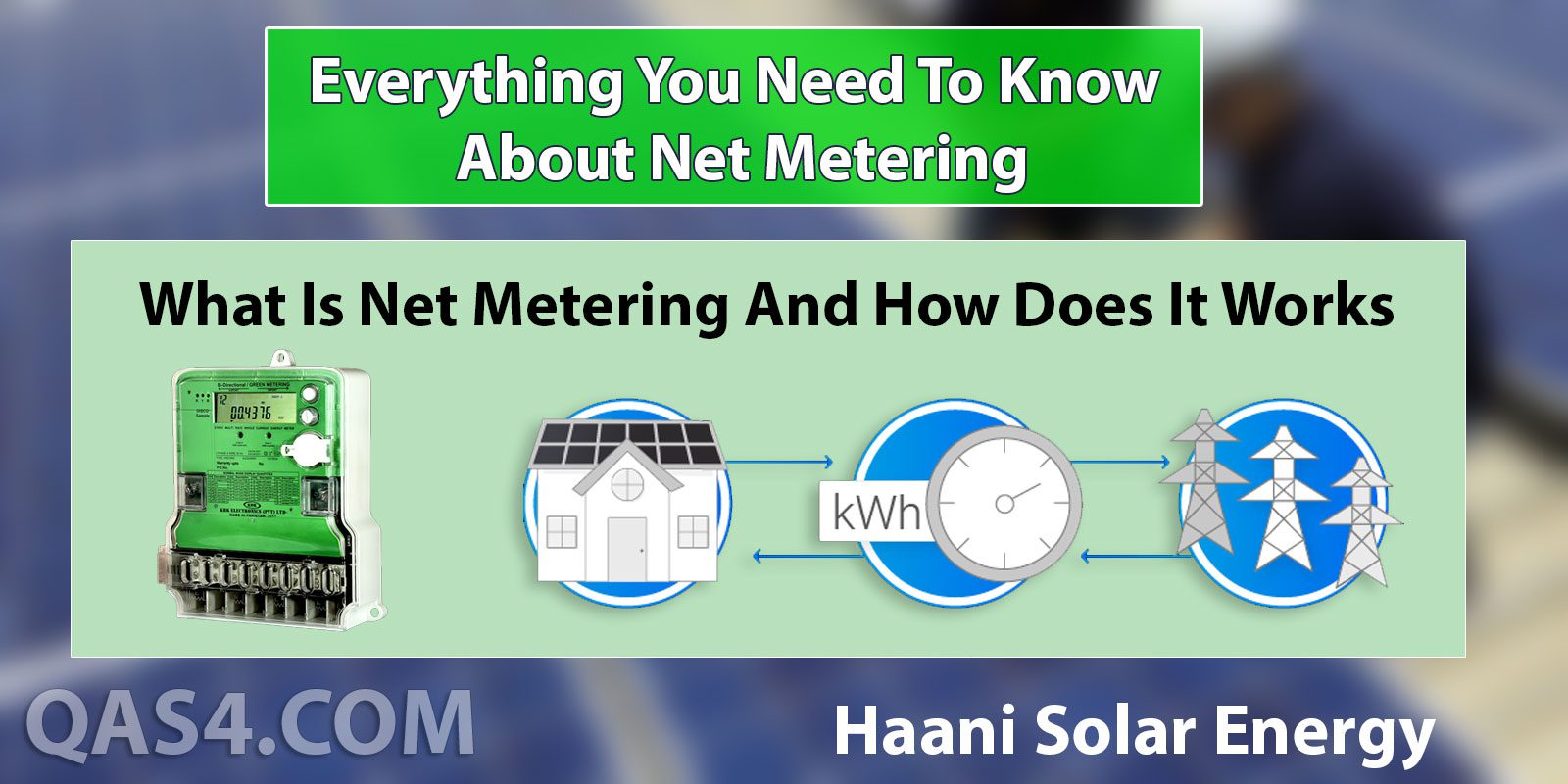Everything You Need To Know About Net Metering In Pakistan
Solar energy is without a doubt and a one of the greatest renewable energy sources that may help us to reduce the pollution and meet the world’s energy needs, especially in regard to our current energy and environmental issues. As more and more peoples are converting to solar energy, the both are residential and business owners are installing solar panel systems in their property and makeing their property value high.
In addition to producing free and a clean electricity, it reduces the high costly bills to down. Because of net metering, solar can be much more advantageous for both the owner and as well as other individuals. Currently this is available in multiple famous and popular regions in Pakistan, the energy management is quickly rolling out the Net Metering systems across the country of pakistan. What is Net Metering exactly? and Should you supply anything a second thought? How can the Haani Solar Energy will support your net metering needs? We are going to discuss in much more details about the net metering, what is it and how does it works? in this blog.
What is The Net Metering Extacly in Pakistan?
Owners of solar energy systems are billed for the electricity they contribute to the grid through a billing method called net metering. For example, a PV system installed on a residential customer’s roof and can produce more electricity than the house uses during the day.
When a house is net-metered, the electricity meter runs backwards to give a credit against the amount of electricity used throughout the night or during the other times when the household uses more electricity than the system can produce. Only the “net” amount of energy used by the customer is billed. Only 20–40% of a solar energy system’s production usually enters the grid and the remaining solar electricity is exported to power loads in the area.

The main benefits of net metering system is if you’re out of your home and you’ve installed the net metering system in house the whole day of electricity generated from the system is going back to grid.
For Example if you’re out of your house:
and if you installed a 10 kw solar net metered system then the the 30 Units genrated from the system is going back to grid because you’re out and none 0 units you’ve used from the grid or wapda.
In Simple Words:
Your house might use the solar energy to produce extra electricity when you’re not home or on days when output is at its highest. There is a way for transferring the extra electricity generated back into the grid without purchasing expensive batteries to store it for use at night.
A reverse billing system is called a net metering maintains records of the amount of the electricity that leaves the user’s system and enters the utility grid. For those who have solar panels put at their homes, Net Metering has proven to be the topping on the cake—it is most cost-effective and best suited for the current solar panel usage.
How the Net Metering Works?
The simplest form of the net metering is the one mentioned above; it’s also known as a “true net metering” or “1-for-1 net metering” because of the utility credits customers for every kWh of electricity they send into the grid, which can then be applied to kWh used during off-peak hours.
When a homeowner installs a solar energy system, the utility replaces the electric meter with a new bi-directional meter and the image of this meter is mentioned down. This new meter has the ability to record the both the energy that the customer uses from the grid and when the solar panels aren’t producing enough power to run the appliances in the house and the energy that the solar panels export to the grid. this is the second and main benefit of the solar net metering system in pakistan also.
Your solar system has the capacity to produce more electricity during the winter months when consumption is on low ( because the most of the appliances run in the hot summer season and they will not run in the winter season and this is the third main benefit of the net metering system), during the summer months when production is high, or normally during the entire year depending on your consumption and production.
With the help of a technology called net metering, you may monitor the distribution of electricity into and out of the grid and return any extra electricity to the grid station, all the monitoring you can do that on you mobile device and on laptop device also through a apk App that can u install from Google Play Store. You are refunded the difference at the end of the month if the amount of electricity your system transferred exceeds the amount of units you imported from the grid. Cash or credit against another bill discount can be used as forms of payment.
The Payment of the Extra units that’s generated from the net metering system that you’ve installed on your home will be added as a dissount on the next month bill let’s check the example down.
For Example:
If your net metering system generated 300 units of a month and you’ve used 180 units of a month then the 120 units will be added on your next month bill as a disscount.
The Main Benefits Of The Net Metering
The Net metering offers multiple advantages, some of which can help to the owner of the solar system and the others of which benefits the grid as well as society as a whole. Here is a summary of the some advantages:
- Net metering Will Reduce Your High Costly Electricity Bill.
- Zero Requirement to Install the Costly Battery Storage Systems.
- Motivate the Customers to Switch to the Renewable Energy like a net metering system.
- Release the Grid Pressure.
- makes solar energy more affordable for homes.
- gives solar owners an easy method to get paid for the energy from their systems generate.
- promotes the installation of the new solar panels on already-existing buildings, reducing carbon emissions and protecting currently undeveloped lands.
- reduces the requirement for new fossil fuel power plants.
- reduces the need for newly constructed electricity transmission facilities which is costly, contentious, and requires some years to approve, finance, and build.
- People who do not own their homes can now profit from solar energy thanks to virtual net metering.

Drawbacks And Controversy of the Net metering
As the advocates of the solar energy, we would love to tell you that net metering has no disadvantages, but that might not be entirely accurate. Study shows that the solar helps favorably to the grid in some situations when a limited number of interconnected net metered systems are present. however, problems appear when the net metering exceeds a threshold that ranges between from 5% to 10% of peak demand.
The following are some of the disadvantages of net metering:
- The value of the net metering credits is not changed according to the amount of time they are created in the absence of the time of use billing.
- A large amount of net metered solar installations reduce grid demand throughout the day, but they do not reduce capacity at nighttime peak hours as the sun sets.
- The distribution of the grid might have a need to be upgraded in order to handle higher levels of two-way power flow when there are many solar installations in a small area. This might result in greater costs for all ratepayers, though the cost usually has to be paid by the system owner when the distribution system infrastructure exceeds its rated capacity.
- Because wealthy people can install solar panels and cut their energy bills almost completely, some utility companies claims that the net metering represents a “cost shift” from higher-income to lower-income households, with those without solar having to pay a larger share of the fixed costs of maintaining the grid.
How Long Does the Net Metering Installation Take?
The installation and operation of the Net Meter can take anywhere between from the 30 to 60 days following the installation of the solar system.
Haani Solar Energy, on the other hand, has a history of finishing most Net Meter installations in 30 days to give our clients peace of mind. We take a proactive strategy, and our Net Metering stay on the top of the everything to make sure there are no delays on our part. They also stay in contact with the authorities to get the job done as smoothly as possible.
Requirements for the Net-Metering to Install?
To install Net Meter at your home, you must have the following requirements.
- Bill 3 phase meter
- Required load as per NEPRA
- and the home owner CNIC Card
Net Metering Requires Payment
Typically, net metering costs between Rs. 80,000 and Rs. 120,000 on top of the system amount. Haani solar Energy wants to make the transition to solar energy as simple as possible for consumers. Talk with our solar experts, and we can help you to find an affordable option.


